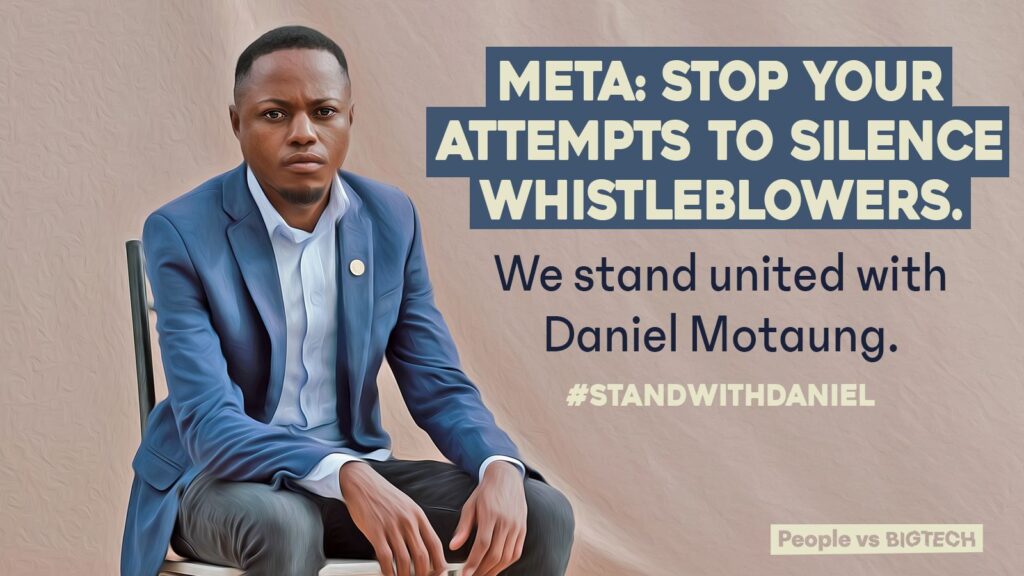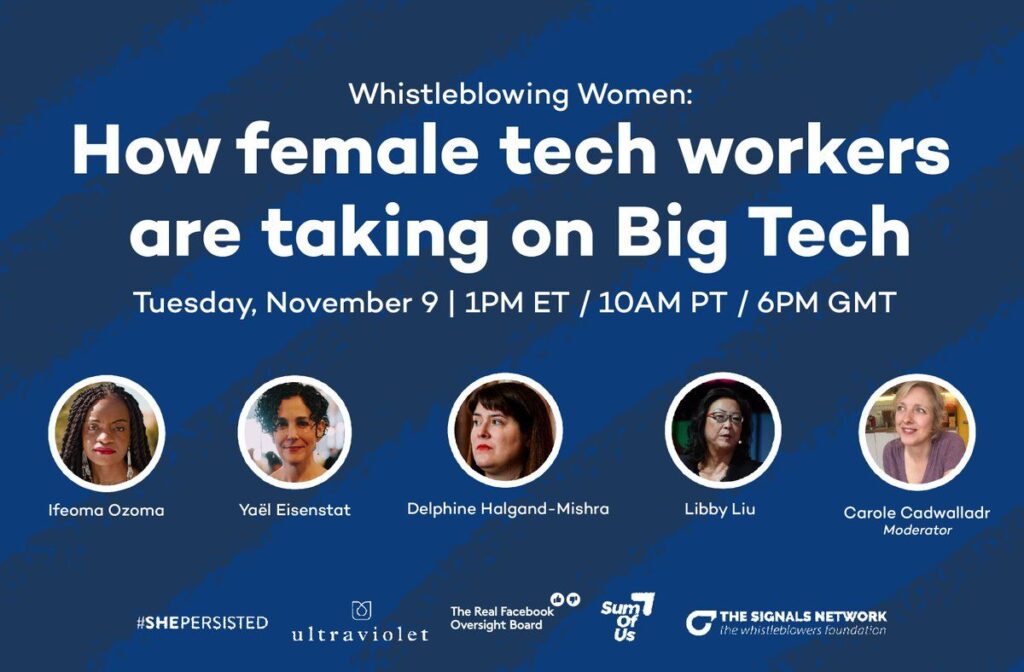Tech Whistleblowers Are No Longer Alone
The recently published Tech Worker Handbook offers essential support for individuals considering whether they should come forward in the public interest

The recently published Tech Worker Handbook offers essential support for individuals considering whether they should come forward in the public interest.
Frances Haugen’s pivotal testimony and disclosures about Facebook have the entire world talking. As a result, politicians across country and party lines are finally coalescing around a common understanding: Big Tech platforms must be better regulated and held accountable for the harms their algorithms impose on society. When taking into account the degree to which so many aspects of today’s technology-driven lives are impacted by the choices made by Big Tech corporations, Haugen's testimony underscores a pressing concern about the lack of accountability. People everywhere want to know: What can be done to stop these harms? And just as important: What else are the tech titans not telling us?
These conversations wouldn’t be happening without Haugen’s brave decision to come forward in the public interest. Big Tech corporations, which have long worked to skirt questions and deny knowledge that their products are indeed harmful, struggle to respond effectively to whistleblowers offering internal documents and insight. Courageous actions like those of Haugen serve an essential role in the campaign for better accountability. In general, as more whistleblowers come forward, more public and political pressure can be applied to enact meaningful change through legislation like the pending Digital Services Act and Digital Markets Act. Given this profound impact, protections for potential whistleblowers -- such as California’s Silenced No More Act -- have begun to spread, too.
Still, choosing whether or not to come forward remains an extremely difficult decision to make -- one made all the more fraught when facing down Big Tech companies with seemingly endless resources. Whistleblower protections are neither universal, nor guaranteed, and all too often potential whistleblowers remain silent -- even when their voices could make a real difference for millions across the globe -- because they are unsure how to navigate the complex path ahead.
)%20copy.jpg)
That’s why last week’s release of The Tech Worker Handbook is such a game changer for individuals debating whether they should speak out in the public interest. Co-created by People vs Big Tech coalition member The Signals Network, in partnership with Pinterest whistleblower Ifeoma Ozoma, Lioness, Whistleblowing International Network, and Matt Mitchell of the Ford Foundation, this essential new resource empowers tech employees by providing them with the critical knowledge they need when considering making such a momentous decision. Already an expert in the space, The Signals Network is a nonprofit organisation that helps whistleblowers and journalists work together to hold powerful interests -- like Big Tech -- accountable.
“The revelations shared by Francis Haugen about Facebook and the Theranos trial currently underway emphasize the critical impact that tech whistleblowers play in safeguarding our democracy and well-being by speaking out,” said Executive Director, Delphine Halgand. “The Signals Network believes The Tech Worker Handbook is a vital piece of the puzzle in creating real accountability in the tech sector.”
GET THE KNOWLEDGE YOU NEED
If you are a tech worker who might have information related to a relevant “incident” at work, the Legal section created by The Signals Network is an essential, immediate read to ensure that you make the best decision for your own well-being. Based on the extensive experience of past and current whistleblowers (along with the people and organisations that provided help for them along the way), the section is designed to help potential whistleblowers understand the various legal implications and considerations related to coming forward. Notably, although the section addresses legal issues it does not provide legal advice -- nor are the included considerations intended to be deemed comprehensive or universally applicable. Rather, the guide “is meant to help you make informed decisions, to give a balanced and concrete overview of the possibilities and pathways, and to remove some of the uncertainty that so many former whistleblowers experienced in order to build your own overall strategy.”
“Whistleblowing can be a long and life-defining journey and it is important to know what your life may hold in the coming months and years and who you need to have on your side.” - The Tech Worker Handbook
Reviewing the guide in its entirety before you move forward can help you:
- Make a personal assessment of your situation, including understanding your goals and determining your risk tolerance level;
- Build the right team in order to best protect yourself and create the maximum impact;
- Know what lawyers have to offer, which type of attorney might be best for your situation, and when to work with them (spoiler: you should consider seeking legal advice ASAP -- the guide notes that doing so doesn’t lock you in to moving forward, but it does help you keep your options open and protect yourself); and
- Understand what it might be like to work with colleagues, unions, civil society organisations, members of the press, US Congress, and regulators as part of your process.
Key additional insight is offered into the complex components and ramifications of non-disclosure agreements, whistleblowing reward programs, internal reporting, work-based retaliation, and evidence documentation. As a way to provide direct commentary on the process, “Fifteen Lessons Learned” are also presented from whistleblowers and lawyers, including
- “Do not wait to talk to a lawyer. Talk to a lawyer ASAP. Your lawyer works for you. Tell them what you want to do.” - Ifeoma Ozoma (Pinterest whistleblower)
- “The world may not believe that the issue has the same significance that you think.” - Ben Wizner (Director of the ACLU’s Speech, Privacy, and Technology Project)
- “Talking to a reporter should not be your first step.” - Tyler Shultz (Theranos whistleblower)
- “Use secure apps, like Signal Messenger and ProtonMail, to communicate with your attorneys and others helping you.” - Mary Inman (Partner at Constantine Cannon LLP)
- “Do not obtain evidence improperly. You cannot commit a crime to catch a crime.” - Tom Devine (Legal Director of the Government Accountability Project)
LOOKING FORWARD
At base, The Signals Network and their partners want tech workers who are considering speaking out against corporate misconduct to know that support and expertise are available to help them make informed decisions about their next steps. The two most common themes whistleblowers bring up when discussing their journeys are: (1) coming forward is difficult, and (2) they wish they had had more support (or were grateful for the support they had). The Tech Worker Handbook is an attempt to acknowledge these realities and help ensure future whistleblowers have the resources and support they need to best navigate a complex situation in which risk can never be entirely eliminated, only mitigated.
The launch of The Tech Worker Handbook marks the launch of The Signals Network’s new Tech Accountability Project in collaboration with Amnesty International. In the coming months, The Signals Network will create and circulate more legal resources in partnership with Amnesty International for tech workers considering blowing the whistle in the United States and in other countries that are key tech hubs. Those interested in learning more should reach out to The Signals Network at [email protected].

We all benefit when potential whistleblowers are better informed. In the words of The Tech Worker Handbook: “Preparedness is Power.” Help spread the word by sharing this story or tweeting:
We ALL benefit from a world in which #techworkers are empowered to speak out in the public interest. Here’s how: https://techworkerhandbook.org/ #techworkerhandbook #PeopleVsBigTech @IfeomaOzoma,@Lioness_Stories, @geminiimatt, @OmidyarNetwork, @TheSignalsNetw, @whistleblowing
Interested in learning more about this ground-breaking guide and issue? Follow The Signals Network on Twitter or check out these articles:
- The Verge: Pinterest whistleblower Ifeoma Ozoma has a new way for tech workers to speak out
- Protocol: Being a tech whistleblower is dangerous and expensive. Now there’s a guide to the risks.
- Business Insider: The woman who went public about Pinterest's workplace problems created a handbook to help tech workers safely become whistleblowers
- Axios: Tech whistleblower launches site for tech whistleblowers
- Fast Company: Pinterest whistleblower launches resources to help tech employees speak out




